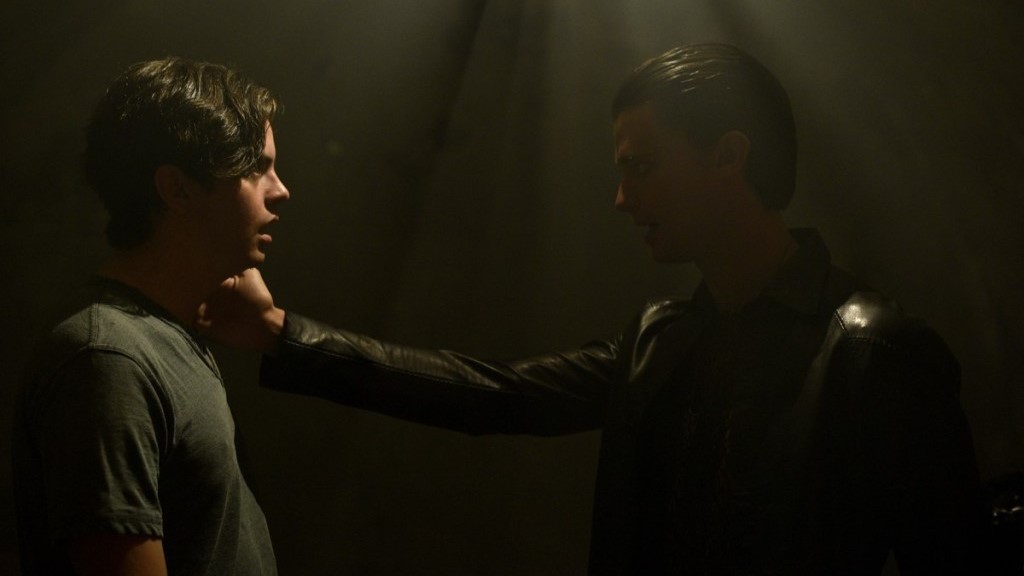Daniel Isn't Real
2019

Rated: NR
Genre: Horror, Thriller
Country: U.S.
Run-Time: 1h 40min
Director: Adam Egypt Mortimer
Cast
Miles Robbins……………………………………Luke
Patrick Schwarzenegger……………..Daniel
Sasha Lane…………………………………………Cassie
Mary Stuart Masterson………………….Claire
So, is Daniel real? Obviously, that is the question of anyone who starts watching a film titled Daniel Isn’t Real, but in honour of my desire to keep my reviews relatively spoiler-free I will not tell; I will only say I did not feel cheated by the answer.
Daniel Isn’t Real, directed by Adam Egypt Mortimer, is the story of Luke, a young boy who starts seeing an imaginary boy named Daniel shortly after witnessing two potentially trauma inducing events; a serious shouting argument between his parents, and a dead criminal gunned downed by police after going on a killing spree in a local dinner. At first, Luke and Daniel seen to coexist without trouble; however, after a potentially deadly mishap, Luke questions the intentions of his imaginary friend and wishes him away.
Years later, we learn that Luke, as a university student, struggles with depression and sees a psychiatrist regularly. After a long discussion, the psychiatrist suggests that Luke’s depression could come from keeping a part of himself repressed and suggests that he let Daniel out. So Luke does.
One of Daniel Isn’t Real’s claims to fame is that it lead stars, Patrick Schwarzenegger and Miles Robbins, who both are the children of Hollywood stardom. (Patrick Schwarzenegger is the son former governor Arnold Schwarzenegger and Miles is the son of Tim Robbins and Susan Sarandon.) Having never seen either of the actors work in previous films or television, I had some concern that the last names of the stars were of bigger interest to the casting director than their ability to act, but, now having seen the film, I can say that both seemed well cast. Schwarzenegger’s Daniel is both charismatic and menacing at the same time, in a way reminiscent of Christian Bale in American Psycho. And Robbins’ plays Luke as a brooding and angst-ridden twenty-something who deals with mental illness at a time when he should be enjoying youthful romps of self-discovery. Both actors are well suited to take us through a pseudo-coming-of-age trip through Hell.
Those who have discussed Daniel Isn’t Real often see it as a commentary on toxic masculinity, and, when through that lens, Schwarzenegger ’s Daniel represents toxic masculinity personified. Daniel is an aggressive, sociopathic extravert who revels in getting Luke to act on his bad ideas. He is not that far removed from a kid in the playground that acts like a friend, gets people to do something inappropriate or dangerous, and then laughs after they get hurt or caught. But Luke fears that Daniel is also representation of his own repressed Id. He is the devil on Luke’s shoulder that always gets him into trouble, but also gets Luke to do what he really wanted to do in the first place. And naturally, for a while, Luke’s life really does seem to get better with Daniel around. But Daniel is less a giver than a taker, and when he starts to take, he takes.
For me, the film worked best when explored in the context of Luke’s mental illness. Prior to reviving Daniel, Luke was clearly depressed. The hallucinations that cripple Luke socially suggest that he is schizophrenic. But the explosion of creativity that Daniel unleashes in Luke has a feeling of someone dealing with bi-polar disorder, entering a manic stage. There are parts of this film that seem to explore mental illness on an allegorical level. And though I have not read the novel the film is based on, In This Way I Was Saved, I have read about it. Mortimer deserves credit for adapting Brian DeLeeuw’s text in a way that keeps its essence even though it deviates from many of sources plot points. And like the book, the film has avid supporters, many of which find the two works actually compliment each other in their differences.
When I began watching Daniel Isn’t Real, I never expected to be scared. But now that I have seen the film, I have to admit that many of its visuals were more unsettling than I expected. Some of the images Mortimer conjures for this film are the stuff of nightmares and remind us that this film is far more horror than psychological thriller.
If you like horror films with a psychological flare, then there is a lot of love in Daniel Isn’t Real. There are parts of this film I found brilliant, but I wish its final scenes where a bit crisper- not so much in plot, but in execution. In the last half hour, the city stops feeling populated, which is too bad because there could had been some fun, horrific interactions between random civilians engaging with an unhinged psychopath. (I nearly classified this film as a Master Work.) But that is one small criticism about a film that I enjoyed immensely and strongly recommend that people see.
